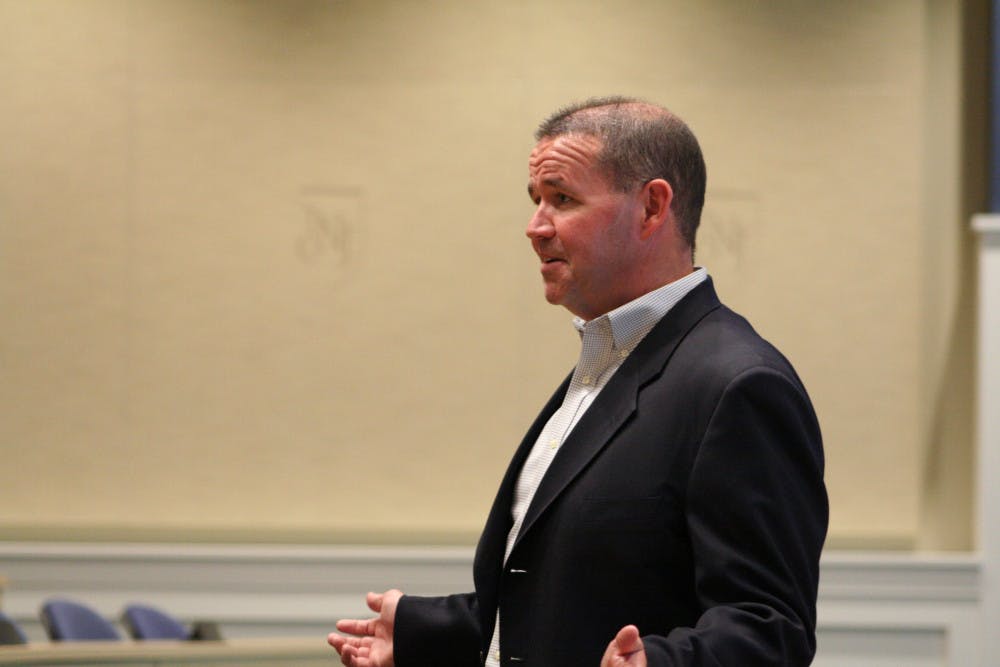By Thomas Infante
Reviews Editor
On the evening of Tuesday, Nov. 15, the College’s Entrepreneurship Club hosted a guest speaker, alumnus Alex Sauickie (’93), in the Education Building.
Sauickie currently works as the chief operating officer of Scivantage, a company that specializes in developing software to analyze financial data. Sauickie spoke about his career in business since graduating from the College, and offered advice to those in the audience who hoped to start their own business one day.
Sauickie graduated from the College in December 1993, back when it was still called Trenton State. Sauickie said it took him an extra semester to graduate because he “had too much fun as an underclassman.” He earned a bachelor’s degree in business administration with a focus on marketing.
Upon graduating, he received a part-time offer from Merrill-Lynch, a large brokerage firm that has since been acquired by Bank of America. He turned it down, in the hopes that he would be offered a full-time position. Luckily, his employer was also an alumnus of the College and so he was given the position he wanted.
Throughout the next six years he spent at the firm, he was promoted seven times, saying that he always “looked ahead to what was next” and never got too comfortable.

“My manager at the time always forced his employees to work outside of their comfort zones,” Sauickie said. “Although I was hired to a position that involved client services, my manager moved me into positions that were focused in areas like operations and finance.”
Being introduced to different areas made him a more savvy businessperson.
“It’s not always best to rise straight up,” he said.
Although he could have continued to work within Merrill-Lynch, Sauickie was eager to branch out further and left to form a startup company that failed after 16 months. After that, he moved to Manhattan to work for Island ECN, an online stock trading company that was a main competitor of NASDAQ at the time. The company was eventually bought by a larger firm called Instinet for more than $500 million. After that, he spent eight years working at yet another startup that was acquired for more than six times its initial value.
Now that Sauickie has extensive experience in many areas of business, he is often offered jobs solely based on that experience.
“Many companies hire me when they are losing a lot of money,” Sauickie said. “My job is to turn the company around, build it back up and sell it at a high enough premium to repay the investors in the company.”
Through years of hard work and many different jobs, Sauickie has become an independent and successful businessperson, and had several points of advice to offer those who are also interested in creating a startup company.
His first piece of advice: persistence.
“You should always go after what you want, be it a job or a relationship,” Sauickie said. “If you get too comfortable, you’ll lose your drive for success.”
His also stressed the importance of networking in the modern business world.
“I use LinkedIn much more (than) I use Facebook,” Sauickie said. “Blogging on your profile helps potential employers see it and could be the difference in getting hired to a competitive position.”
Sauickie also emphasized the importance of public speaking in a professional environment.
“It’s something that everyone should learn because of how often you’ll have to speak in front of a group,” Sauickie said. “When I was a kid, I hated practicing public speaking, but as I got better, it became natural.”
His final piece of advice to those with an idea for a startup was simple: Do it now.
“Don’t wait on your good ideas,” Sauickie said. “When I was in college, I had the same idea to make a social media platform just like Facebook before it even existed. You don’t want to regret not developing a great concept.”
Like any successful businessperson, Sauickie is familiar with the concept of risk and told the audience that risk can be justified depending on what exactly one is trying to achieve.
“I left Merrill-Lynch because the passion I had for having a top position at a startup company was worth more to me than a decent job,” Sauickie said. “There was a trade off of ownership/equity and benefits/stability.”
Sauickie told the audience to take it easy once in awhile and find hobbies or activities to relieve stress outside of work.
“For the first 10 years of my career I worked brutal hours,” Sauickie said. “It was unhealthy. I was overweight and sleep-deprived. But just like my career, I set goals for myself, and in July of this year (I) finished my first Ironman race.”
Although Sauickie has had his share of business failures, he said he regrets none of the choices he made throughout his career.
“Even if a company fails, you still gain valuable experience in running it,” Sauickie said. “That’s worth more than anything else.”







